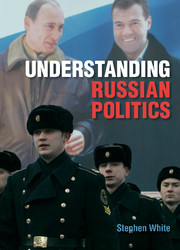Book contents
- Frontmatter
- Contents
- List of figures
- List of tables
- Preface
- Map: administrative units under the 1993 Constitution
- 1 From communist to postcommunist rule
- 2 Voters, parties and parliament
- 3 Presidential government
- 4 From plan to market
- 5 A divided society
- 6 Changing times, changing values
- 7 Russia and the wider world
- 8 What kind of system?
- Notes
- A Note on surveys
- Index
- References
3 - Presidential government
Published online by Cambridge University Press: 05 June 2012
- Frontmatter
- Contents
- List of figures
- List of tables
- Preface
- Map: administrative units under the 1993 Constitution
- 1 From communist to postcommunist rule
- 2 Voters, parties and parliament
- 3 Presidential government
- 4 From plan to market
- 5 A divided society
- 6 Changing times, changing values
- 7 Russia and the wider world
- 8 What kind of system?
- Notes
- A Note on surveys
- Index
- References
Summary
Russia had already established a directly elected presidency during the final year of Soviet rule. But it had also elected a new parliament, and it was not until the adoption of the 1993 Constitution, after parliamentary resistance had been violently suppressed, that it became what some called a ‘superpresidency’, with the government headed by the prime minister as its executive agency. Yeltsin was succeeded in 2000 by Vladimir Putin, and then Putin, after the end of his second four-year term, by Dmitri Medvedev, with Putin remaining as prime minister. Russians themselves called this new arrangement a ‘tandem’. It did not, all the same, appear to represent a real and enduring redistribution of authority, Putin continued to be seen as the dominant figure, and it was widely expected that he would return to the presidency in 2012, when Medvedev's first term expired. Whoever held the leading positions, this was clearly a political system dominated by a powerful executive. It was less clear that there were mechanisms that would help to ensure that this dominant power was not abused by those who exercised it, and perhaps in their own interests.
The end of the Soviet period saw the establishment of an executive presidency in Russia as well as the USSR itself, although the dominance of a single leader was of much older origin.
- Type
- Chapter
- Information
- Understanding Russian Politics , pp. 71 - 114Publisher: Cambridge University PressPrint publication year: 2011



